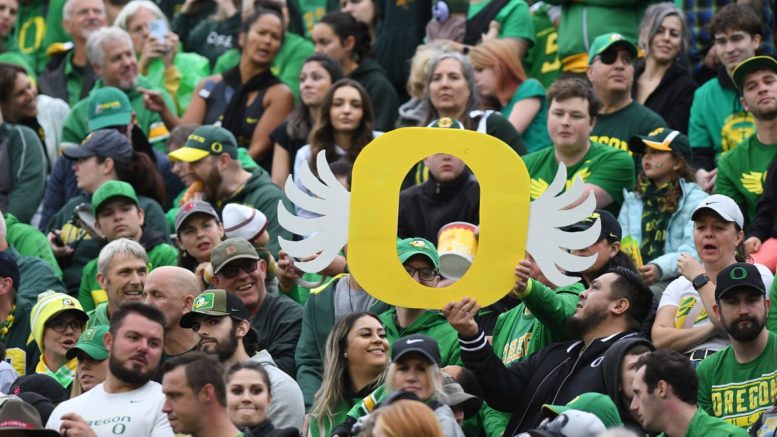On Friday, 32 members of the University of Oregon’s women’s beach volleyball and rowing teams filed a class action lawsuit in federal court that accuses the University of depriving female athletes of “equal treatment and benefits, equal athletic aid, and equal opportunities to participate in varsity intercollegiate athletics in violation of Title IX of the Education Amendments of 1972,” according to a press release distributed by their attorneys.
The complaint, which is over 100 pages, claims that the University “treats more than a third of its male student-athletes—the men on its football team—unbelievably better” than any of the school’s female athletes, citing “palatial locker rooms, ‘fitting’ rooms, and player lounges; state-of-the-art, personalized gear and equipment…chartered flights to away games; hotel stays before home games; huge quantities of food and travel per diems for more food… professional-quality practice and competitive facilities; their own theater with seats upholstered in Ferrari leather…round-the-clock access to trainers and medical professionals… highly-paid coaches and assistant coaches with plush offices and special amenities, including their own hot tub.”
Having been to Oregon’s campus a few years ago, I can vouch for the fact that the $68 million football performance center definitely stands out on campus as a shrine to Ducks football. My campus tour guides even joked at the time that, if anyone at Oregon deserved a palace like the FPC, it was Oregon’s storied track team.
In contrast to the football team, the suit says, the University fails to give the beach volleyball team “any athletic scholarships; adequate locker rooms, practice and competitive facilities; sufficient travel accommodations and daily allowances; appropriate equipment and supplies; even minimal publicity and recognition; and honest or fair recruiting support.”
Beach volleyball at Oregon doesn’t even have a facility. “Oregon does not provide the women’s beach volleyball team with any practice or competitive facilities,” the suit alleges. Instead, the team practices and competes at a public park with no stands for spectators, no doors on the public bathroom stalls and is “frequently littered with feces, drug paraphernalia, and other discarded items.”
Further, the suit claims that while women comprise 49 percent of the varsity athletes at Oregon, the school spends only 25 percent of its athletic budget (and 15 percent of its recruiting budget) on its women athletes. The plaintiffs contend that Oregon’s beach volleyball team is the only varsity team at Oregon and in the entire PAC-12 that “does not receive a single dollar of athletic financial aid” from its school.
As for the women’s rowing team, they say the school won’t let them exist as a varsity sport at all, relegating them to a club sport, even though the school needs to add 94 additional athletes in order to reach gender parity. The complaint claims Oregon is “failing to provide substantially proportionate athletic participation opportunities to women, Oregon refuses to add varsity women’s teams for which there is interest, ability, and competition available.”
Lori Bullock, one of the attorneys for the plaintiffs, told Deadspin that the rowing team has existed for 20 years and has repeatedly asked to be able to compete in PAC-12 championships (like the men’s rowing club was), but has been repeatedly denied by the school, who doesn’t believe they are obligated to add any varsity sports under Title IX.
Attorney for the plaintiffs, Arthur Bryant, says Oregon has had plenty of time to clean up its Title IX act, pointing to a front-page article in The Oregonian over three months ago that detailed systemic equality problems with the beach volleyball team. “Title IX has been the law for more than fifty years. Oregon needs to comply with it, now,” said Bryant.
USA Today reported in June that Oregon athletics brought in nearly $153,510,555 million and spent $140,565,297 million, giving the school net earnings of $12,945,258. Far less than the casual sports fan probably thinks college sports net at a D1 school, but enough money to make a world of difference to athletes on the beach volleyball and women’s rowing teams.
Bullock told Deadspin that the age-old argument that schools should be allowed to spend more on (almost exclusively men’s) revenue sports, like football and basketball, because they bring in more money, doesn’t hold up under the law.
“Title IX doesn’t care,” she said via telephone, adding that Title IX does not differentiate between revenue and non-revenue sports in demanding gender equity.
“Of course football brings in revenue,” Bullock said, “Football has been fully-supported sports for over 100 years; Colleges and media machines have been dumping money into this sport for decades, So when you invest in those sports the way colleges have invested in football those investments eventually do pay off.” But Bullock said that most football programs aren’t revenue-positive sports. “Does (football) bring in revenue? Yes. Does it cover all the expenses, all of the facilities, all of the coaching staff, everything they provide? For most universities, the answer is no. It’s not as though they are paying for their own team, their own facilities with ticket sales or media buys, it’s the school purposefully directing money their way.”
Bullock pointed out that while schools heavily fund-raise for men’s football and basketball, but “they are just not doing that for women.”
Additionally, Bullock said that when Congress was debating Title IX back in 1972, a number of lawmakers specifically tried to exempt football from Title IX coverage, but Congress adamantly refused. Bullock paraphrased Congress’ response as “You don’t get to just exempt one of the largest sports that you’ve been supporting for men for decades, and it gets put on its own pedestal.”
“Budgetary expenses are not an excuse to allow schools to violate Title IX,” Bullock continued. “So the fact that a sport brings in revenue or doesn’t bring in revenue or even how expensive a sport is or is not is nothing something courts can take into consideration when it comes to Title IX.”
Deadspin reached out to Oregon for comment, with specific questions,, and they provided us with the following statement:
The University of Oregon is committed to providing a quality, positive experience for all our student-athletes. UO Athletics provides all student-athletes, including our female athletes, with academic support, tutoring, student-athlete development, medical care, mental health support, meals and snacks, and nutrition and sports training. With the modernization of NCAA rules in recent years, we are also proud that we have been able to provide student-athletes with the maximum academic benefit allowed within the restrictions of the Alston decision, in addition to these other benefits.
For beach volleyball, in addition to all other benefits, UO has already previously committed to increasing scholarships and to building a beach volleyball facility on campus at a site identified via the Campus Planning process. This site planning process began in 2019 and the project is now in the development phase.
The University believes it complies with Title IX. UO has not yet been served a copy of the complaint, and therefore we are unable to comment on any further specifics.
Deadspin was able to access the complaint via the plaintiffs’ attorneys’ website.
Original source here
#Oregon #hit #Title #lawsuit #allegations #rough





